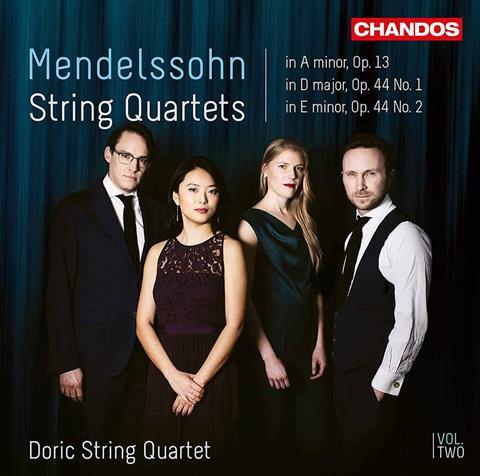A magnificent conclusion to an outstanding quartet cycle

THE STRAD RECOMMENDS
The Strad Issue: February 2022
Description: A magnificent conclusion to an outstanding quartet cycle
Musicians: Doric Quartet
Works: Mendelssohn: String Quartets: no.2 in A minor, op.13, no.3 in D major op.44 no.1, no.4 in E minor op.44 no.2
Catalogue number: CHANDOS CHAN 20257 (2 CDs)
For the second and final volume in its Mendelssohn cycle, the Doric Quartet focuses on the composer’s two most popular quartets in D major and E minor (from the op.44 set of three) in performances that combine the adrenal stile brillante of the Melos Quartet’s classic 1970s set for DG, with a dynamic suppleness and subtlety all its own. There is a beguiling seamlessness and unforced clarity to the quartet’s sound world, enhanced by exquisite vibrato shadings that at times reduce to a skin-tingling senza (most memorably in the D major Quartet’s gently swaying second movement). All four are wonderful players, but leader Alex Redington’s sleight-of-hand negotiation of Mendelssohn’s often tricky figurations deserves special mention.
In Mendelssohn’s outer movements (especially in the works of his middle period), is it all to easy to adopt a kind of ‘heads down and see you at the end’ mindset, yet the Doric players somehow find endlessly imaginative ways of characterising the music’s peaks and troughs without losing an imperative sense of forward momentum. The early A minor Quartet is also shaped with such keen sensitivity to musical atmosphere so that it takes its place naturally alongside such other prodigy miracles at the String Octet and First String Quintet.
There are a number of distinguished Mendelssohn quartet cycles currently available, but the Doric Quartet is quite frankly in a class of its own, complemented by lucid and immaculately balanced sound from Jonathan Cooper. To hear this ensemble metaphorically dance and smile its way through the Fourth Quartet’s irresistibly contagious E major scherzo is alone worth the price of admission.
JULIAN HAYLOCK











































No comments yet